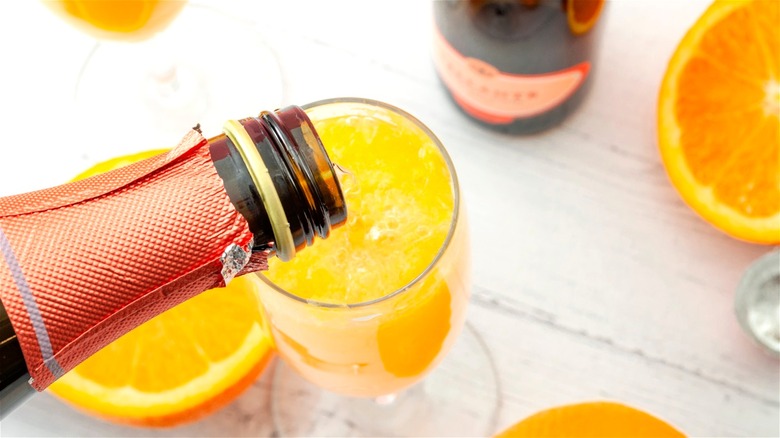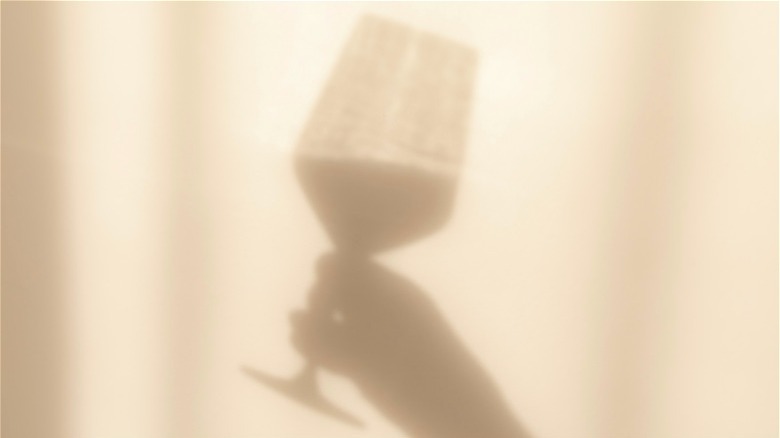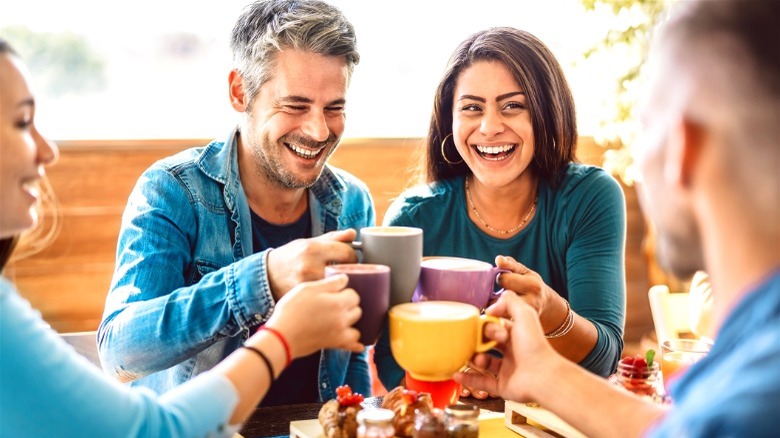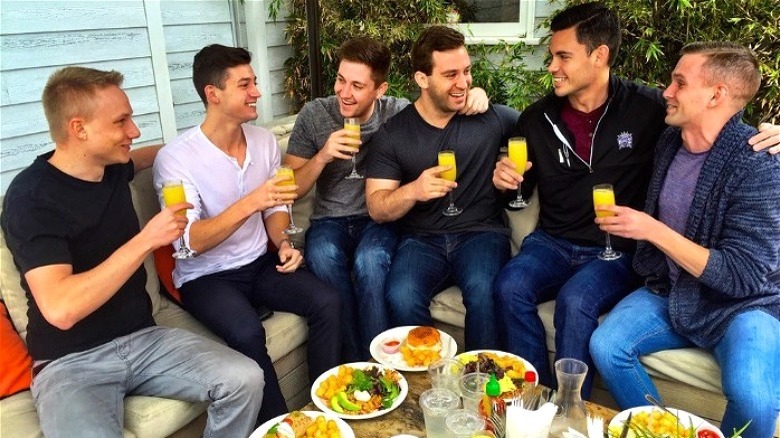The Truth About The Demise Of Manmosas
Picture yourself relaxing this summer on a late Saturday morning at your favorite roof-top restaurant catching up with a friend while sipping coffee or a spicy bloody. After a long busy week, you're about to take your first bite of that well-deserved eggs benedict when a gentleman at the table across from you requests a "manmosa." You might think you heard wrong, but let it be known the manmosa, a shoot-off of the classic mimosa which is comprised of orange juice and champagne, is in fact, a real drink.
While there are many amazing brunch cocktails out there, you probably didn't expect some of the available options to be gendered. So, what makes the manmosa a men's only drink?
There is some debate about the drink's intricacies, the masculine beverage is traditionally made of orange juice, beer, and vodka (per Urban Dictionary). Esquire believes it to be often confused with the brass monkey (which is a concoction of orange juice, rum, and vodka), and there are many variants of the manmosa on the internet, but vodka and beer are supposed to make it stand tall against the threat of feminity.
According to The Takeout, however, the gendered premise behind this testosterone-induced cocktail is pushing it further and further into the past where the world once had only stereotypical definitions of what it meant to be a man in the 21st century.
Manmosas might soon be a drink of the past
With the #MeToo movement gaining traction over the last ten years, there has been more attention given to the standard definition of masculinity that has been ingrained in our culture (via VeryWell mind). Some believe that masculinity is a definition that pushes men to hide their feelings, show strength, and remove all signs of emotional weakness (per The Guardian).
With positive changes being addressed for the sake of all humanity, certain gender constructs (like stereotypical drinks) are being reconsidered on popular menus. According to The Spirits Business, most restaurant owners do not believe gender exists when it comes to a person's beverage of choice, yet societal expectations and product marketing are factors that still have an influence on today's consumers.
Some years back, The Tab poked fun at the rise of the manmosa claiming the drink was popular "because men need to be reassured of their masculinity while enjoying brunch." Most tweets with the #manmosa hashtag include some "bro" related rhetoric or are deduced to men celebrating Father's Day.
Redditors weighed in on the issue as well and many users believe the drink to be a silly addition to the modern menu, while some begrudgingly confirmed men still order the drink fearing a regular mimosa served in the classic champagne flute might threaten their masculinity.
While the manmosa is still a staple on some American menus, it raises some important questions about masculinity and the gendered assumptions of men who enjoy brunch (via The Takeout).
Brunch and its gendered history
The history of brunch ranges from churchgoers in the 1800s to cookbooks in the 1950s suggesting alcohol and advertising the idea of one fewer meal women had to cook at home (per NPR).
As brunch grew in popularity during the 21st century, members of the LGBTQ population began using the all-day meal environment to raise money for pertinent issues affecting the queer community. According to The Guardian, "drag brunches" increased as well, causing some people to form opinions around brunch as an activity reserved for women and gay men only.
D Magazine claims brunch to be essentially "gay" for being "on trend" — a meal that excludes children, where vast amounts of alcohol are encouraged, and within an environment where you sit around all afternoon and chat with your friends. Pop culture has also used brunch as an association with the queer community in shows like "Sex and the City" and "Will & Grace."
The connection between brunch and gay men ensued a discussion on Reddit, with one user blaming pop culture for the stereotypes claiming "Sex and the City" was a great selling tactic. Another Redditor believes brunch to be popular among big cities since "gays gravitate to population centers because they are more liberal and accepting."
True or not, the rampant stereotypes made about those who brunch give way to more outlandish rigidity as heterosexual men defend the decision to eat an afternoon omelet.
The prevalence of toxic masculinity in manmosa form
It does seem that many men are looking for ways to defend their decision to brunch based on cultural stereotypes. In "A Man's Guide to Surviving Brunch" the advice is to arrive late and have obnoxious food requests. The notion behind the article signifies that no one who brunches cares about sports and "sooner or later we're all dragged into the vortex of billowy hats, crepes, and frittatas."
While anyone can enjoy a solid frittata, the problem with drinks like the manmosa is that it safeguards the premise of toxic masculinity in mainstream culture (per Medical News Today). In order to change a society dominated by "bro-culture" standards, bystanders need to be more involved in the dismantling process, not just women and a few men attempting to break down the outdated gender norms (via The Cut).
Karen Fu, bar manager at "Studio Bar" in NYC's Freehand Hotel states "The ever-constant battle of gender applied to drinking culture will persist so long as misaligned perceptions still exist," (via Liquor). Luckily, some restaurants are already making changes to a more inclusive drink menu.
Gender aside, drinking champagne and O.J. is popular because people genuinely enjoy the taste. It's time for more men to openly enjoy this brunch classic if they truly like it, and give up the manmosas they may not actually like at all.



